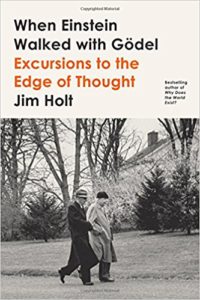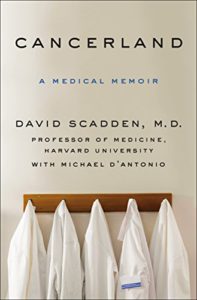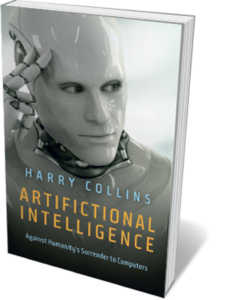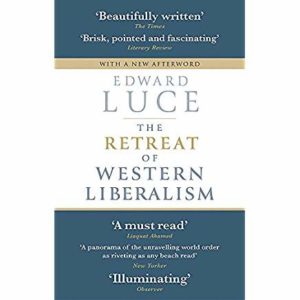26 July 2018 (Crete, Greece) — Every summer my wife and I take a 5-week holiday, usually in Greece but not always. This year: a Greek summer of sun-sand-sea but as always some “brain stuff” like joining an archaeological dig (one of my wife’s passions since university days), plus one of the ARCHELON projects to save sea turtles (both our thing). Two years ago we matched it up with a course in ancient DNA, a program run by the specialized Ancient DNA Lab at the Natural History Museum in London.
Yes, what my wife calls “our summer of hard leisure”.
So not a lot of reading time this year. I had to choose carefully. My reads/recommendations are as follows (I have started all four books; I tend to read 3-4 books all at the same time because, really, everything is related):
When Einstein Walked with Gödel
Jim Holt (2018)
One of the finest books I have read in years. Here, philosopher Jim Holt gathers two decades’ worth of reviews and essays, written for the New York Review of Books, the New Yorker and other publications. These are bold, thought-provoking pieces that tackle everything from the physical principle of least action to the mathematics of the infinitely great and infinitesimally small. As an AI student I was aware that the zeros of the zeta function describe the distribution of the prime numbers. The related Riemann hypothesis is one of the great unsolved maths problems, and Holt helped me to understand why it’s important. If true, there’s a hidden harmony to the primes; if false, many supposed proofs of contemporary mathematics would fall with it.
There is some repetition of Holt’s obsessions. These include the dichotomy between philosophies of mathematics, and the logician Kurt Gödel’s claim (during his citizenship hearing) that the U.S. Constitution was logically inconsistent. Holt has revised some pieces. A discussion of Harry Frankfurt’s On Bullshit, dating from the first flowering of “truthiness” in the administration of president George W. Bush, is updated with a depressing reference to Donald Trump.
These are stories of real humans and their mathematical, physical and philosophical theories — some of the most complex ever devised.
Cancerland: A Medical Memoir
David Scadden with Michael D’Antonio Thomas Dunne (2018)
A number of years ago I met Regina Barzilay at MIT (she is the Delta Electronics Professor of Electrical Engineering and Computer Science at MIT). She was diagnosed with breast cancer in 2014. She soon learned that good data about the disease is hard to find. So she began an ambitious bid to revolutionize cancer care, relying on a tool largely unrecognized in the oncology world but deeply familiar to many of you reading this post: machine learning (ML). I was captivated and began a deep dive across the different areas of cancer care … diagnosis, treatment, prevention … and the data protocols.
Cancer has been characterized as a heterogeneous disease consisting of many different subtypes. The importance of classifying cancer patients into high or low risk groups has led many research teams, from the biomedical and the bioinformatics field, to study the application of ML learning methods. To date I have read 42 books about cancer, three of them about ML, although the best works are the numerous scientific research papers and the software studies put out by companies like Intel and NVIDIA who are at the forefront of developing ML methods for cancer work.
Cancer is a foreign country with different norms, asserts David Scadden in this gripping medical memoir. A leading immunologist and oncologist, Scadden (with writer Michael D’Antonio) examines the disease’s recent history through interconnected lenses. Patients’ often harrowing experiences twine through the narrative on research and treatments, from chemotherapy, bone-marrow transplants and lumpectomies to CRISPR and immunotherapies. Scadden’s own eventful life in the lab (not least, his co-founding of the Harvard Stem Cell Institute in Cambridge, Massachusetts) is a highlight.
Artifictional Intelligence
Harry Collins (2018)
This book is not due to be published until this fall but the publisher was kind enough to send me an advance copy. Harry Collins has long focused on gravitational-wave physics (see his book Gravity’s Kiss: the Detection of Gravitational Wave which does a marvelous job explaining a very complex subject). Here, he shifts gears dramatically to examine pervasive existential fears over artificial intelligence and its perceived threat in the “deep learning” era. I highly recommend it to my AI mavens. Collins probes this idea trenchantly and in considerable detail. Pointing to computers’ inability to factor in social context, master natural language use well enough to pass a severe Turing test, or wield embodied cognition, he argues that the real danger we face is not a takeover by superior computers, but slavery to stupid ones.
Awhile back I began an email exchange with Edward Luce (the Washington columnist and commentator for the Financial Times) and the result was an offer to review his recent book, so this is a bit of a “homework assignment”. Plus I wanted a respite from the science/technology readings. And it also dovetails a bit with a very interesting dinner conversation I had this past weekend with a group of Chinese business people and academics attending one phase of the Mykonos “unconference”. Though many in Asia dislike him as much as the Europeans do, they see in Trump a more substantial figure. In Chinese eyes, Trump’s response is a form of “creative destruction”. He is systematically destroying the existing institutions — from the World Trade Organization and the North American Free Trade Agreement to Nato and the Iran nuclear deal — as a first step towards renegotiating the world order on terms more favorable to Washington. More to come in my review of the book, due out in the fall.
To be sure, an anxious and beleaguered mood hangs over the liberal democratic world. Scholars, policymakers, and experts – including Luce – fear that the postwar Western system is breaking down in the face of a profound crisis driven not by external threats but by deep forces at work within the West itself. Luce’s well-crafted book locates the origin of the crisis in declining economic opportunities available to Western middle classes. A majority of workers in the United States and Europe are “treading water,” he writes, which has had a far-reaching, corrosive effect on social and political institutions and has created openings for populist and reactionary appeals. Rising inequality has called into question the notions of progress and social advancement that underpin the Western model of politics and economics. Meanwhile, aside from the superrich, the beneficiaries of this decaying postwar order are China and other non-Western developing states, which have prospered mightily even as they remain hostile to Western political values. My read on all of this? Advanced democracies are unlikely to experience a recurrence of the fast-paced technological innovation and explosive growth that propelled them to prosperity in the first place.




